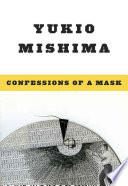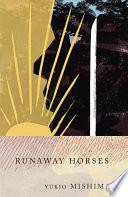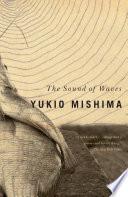Works

The Temple of the Golden Pavilion
Yukio Mishima
Confessions of a Mask
Yukio MishimaSun and Steel
Yukio Mishima
Runaway Horses
Yukio MishimaThe Sailor Who Fell from Grace with the Sea
Yukio Mishima
Thirst for Love
Yukio MishimaKen
Yukio Mishima
Spring Snow
Yukio Mishima
The Sound of Waves
Yukio MishimaAfter the Banquet
Yukio Mishima
Forbidden Colors
Yukio Mishima
The Decay of the Angel
Yukio MishimaFamous Yukio Mishima Quotes
Source: Runaway Horses
https://www.japantimes.co.jp/culture/2018/06/02/books/book-reviews/yukio-mishimas-demons-full-force-runaway-horses/ note: Runaway Horses (1969)
“Nobody even imagines how well one can lie about the state of one’s own heart.”
Source: Thirst for Love
“When silence is prolonged over a certain period of time, it takes on new meaning.”
Source: Thirst for Love
Yukio Mishima Quotes about the world
Source: The Temple of the Golden Pavilion
“… of all the kinds of decay in this world, decadent purity is the most malignant.”
Source: Confessions of a Mask
“if the world changed, i could not exist, and if i changed, the world could not exist”
Source: The Temple of the Golden Pavilion
Addressing the SPF Garrison at Ichigaya Camp during his failed coup attempt, as quoted at "Yukio Mishima" by Kerry Bolton at Counter Currents Publishing http://www.counter-currents.com/2011/01/yukio-mishima-2/; upon going back inside he is said to have commented to his followers: "I don't think they even heard me".
Final address (1970)
The Temple of the Golden Pavilion (1959).
Context: What transforms this world is — knowledge. Do you see what I mean? Nothing else can change anything in this world. Knowledge alone is capable of transforming the world, while at the same time leaving it exactly as it is. When you look at the world with knowledge, you realize that things are unchangeable and at the same time are constantly being transformed. You may ask what good it does us. Let's put it this way — human beings possess the weapon of knowledge in order to make life bearable. For animals such things aren't necessary. Animals don't need knowledge or anything of the sort to make life bearable. But human beings do need something, and with knowledge they can make the very intolerableness of life a weapon, though at the same time that intolerableness is not reduced in the slightest. That's all there is to it.
Source: The Sailor Who Fell from Grace with the Sea
Yukio Mishima Quotes about life
“For clearly it is impossible to touch eternity with one hand and life with the other.”
Source: The Temple of the Golden Pavilion
“I want to make a poem of my life.”
As quoted by Mishima's biographer, Henry Scott-Stokes in the documentary Yukio Mishima : Samurai Writer (1985)
Source: Sun and Steel (1968), p. 57.
Runaway Horses (1969), as translated by Michael Gallagher (1973).
Yukio Mishima: Trending quotes
Yukio Mishima Quotes
“There is no virtue in curiosity. In fact, it might be the most immoral desire a man can possess.”
Source: Confessions of a Mask (1949), p. 222.
Source: Sun and Steel (1968), p. 87.
Context: Only through the group, I realised — through sharing the suffering of the group — could the body reach that height of existence that the individual alone could never attain. And for the body to reach that level at which the divine might be glimpsed, a dissolution of individuality was necessary. The tragic quality of the group was also necessary, the quality that constantly raised the group out of the abandon and torpor into which it was prone to lapse, leading it to an ever-mounting shared suffering and so to death, which was the ultimate suffering. The group must be open to death — which meant, of course, that it must be a community of warriors.
"The Priest of Shiga Temple and His Love" in Death in Midsummer, and Other Stories (1966), p. 61.
Context: By means of microscopic observation and astronomical projection the lotus flower can become the foundation for an entire theory of the universe and an agent whereby we may perceive the Truth. And first we must know that each of the petals has eighty-four thousand veins and that each vein gives eighty-four thousand lights.
“Beauty is something that burns the hand when you touch it.”
Source: Forbidden Colors
“The special quality of hell is to see everything clearly down to the last detail.”
Source: The Temple of the Golden Pavilion
“There isn't any fear in existence itself, or any uncertainty, but living creates it.”
Source: The Sailor Who Fell from Grace with the Sea
“He felt that taking naps was much more beneficial than confronting catastrophes.”
Source: Spring Snow
Source: Confessions of a Mask (1949), p. 118.
Context: At no time are we ever in such complete possession of a journey, down to its last nook and cranny, as when we are busy with preparations for it. After that, there remains only the journey itself, which is nothing but the process through which we lose our ownership of it.
“All my life I have been acutely aware of a contradiction in the very nature of my existence.”
As quoted in Mishima : A Life in Four Chapters (1985).
Context: All my life I have been acutely aware of a contradiction in the very nature of my existence. For forty-five years I struggled to resolve this dilemma by writing plays and novels. The more I wrote, the more I realized mere words were not enough. So I found another form of expression.
Source: Sun and Steel (1968), p. 9.
Context: Words are a medium that reduces reality to abstraction for transmission to our reason, and in their power to corrode reality inevitably lurks the danger that the words will be corroded too. It might be more appropriate, in fact, to liken their action to excessive stomach fluids that digest and gradually eat away the stomach itself.
Many people will express disbelief that such a process could already be at work in a person's earliest years. But that, beyond doubt, is what happened to me personally, thereby laying the ground for two contradictory tendencies within myself. One was the determination to press ahead loyally with the corrosive function of words, and to make that my life's work. The other was the desire to encounter reality in some field where words should play no part at all.
Source: Confessions of a Mask (1949), p. 153.
Context: My "act" has ended by becoming an integral part of my nature, I told myself. It's no longer an act. My knowledge that I am masquerading as a normal person has even corroded whatever of normality I originally possessed, ending by making me tell myself over and over again that it too was nothing but a pretense of normality. To say it another way, I'm becoming the sort of person who can't believe in anything except the counterfeit.
“Anything can become excusable when seen from the standpoint of the result”
Source: The Temple of the Golden Pavilion
Source: The Temple of the Golden Pavilion
Source: Confessions of a Mask (1949), p. 208.
Context: I received an impassioned letter from Sonoko. There was no doubt that she was truly in love. I felt jealous. Mine was the unbearable jealousy a cultured pearl must feel toward a genuine one. Or can there be such a thing in this world as a man who is jealous of the woman who loves him, precisely because of her love?
Source: The Sailor Who Fell from Grace with the Sea
Source: Confessions of a Mask (1949), p. 220.
“I had no taste for defeat — much less victory — without a fight.”
Source: Sun and Steel (1968), p. 49.
Source: The Sound of Waves (1956), p. 31, ch. 4.
“Is there not a sort of remorse that precedes sin? Was it remorse at the very fact that I existed?”
Source: Confessions of a Mask (1949), p. 144.
Ryuji, the sailor in The Sailor Who Fell From Grace With The Sea (1965), p. 38.
Yukio Mishima on Hagakure : The Samurai Ethic and Modern Japan (1977) as translated by Kathryn Sparling, p. 105; Mishima's commentary on the sayings of Yamamoto Tsunetomo.
Spring Snow (1968), as translated by Michael Gallagher (1972).
“As he saw it, there was only one choice — to be strong and upright, or to commit suicide.”
"Sword" ("Ken"), quoted in 三島由紀夫短編集: Seven Stories, translated by John Bester (2002), p. 46.
"Sword" ("Ken"), quoted in 三島由紀夫短編集: Seven Stories, translated by John Bester (2002), p. 67.
"Raisin Bread", quoted in 三島由紀夫短編集: Seven Stories, translated by John Bester (2002), p. 21.
Runaway Horses (1969), as translated by Michael Gallagher (1973).
Source: Confessions of a Mask (1949), p. 115.
"Cigarette" ("Ta- bako") story, quoted in 三島由紀夫短編集: Seven Stories, translated by John Bester (2002), p. 110.
"The Priest of Shiga Temple and His Love" in Death in Midsummer, and Other Stories (1966), p. 59.
"Cigarette" ("Ta- bako") story, quoted in 三島由紀夫短編集: Seven Stories, translated by John Bester (2002), p. 110.
The Temple of the Golden Pavilion (1959).
[At the movie's ending, speaking to the soldiers]
Final address (1970)
